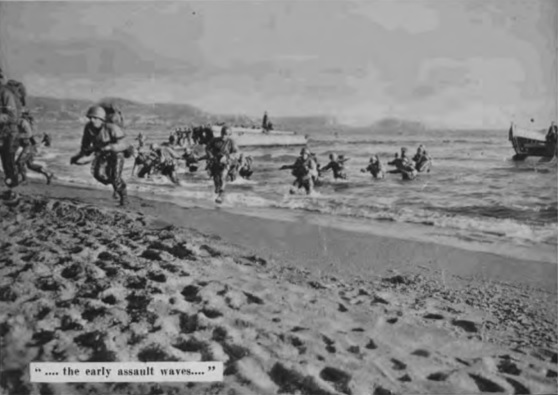Operation Avalanche
 |
| South of Salerno, Italy |
Winston Churchill wanted to invade Europe starting in Italy but George Marshall, Chief of Staff of the U.S. Army, wanted no part in it. But time played it's part and it became apparent to both that the Normandy invasion wouldn't take place until 1944. So the U.S. agreed to give the Europe invasion a trial one in Italy, hoping it would tie down the German forces and keep them away from the beaches of Normandy. There was no U.S. commitment for further engagement or follow up operations.
Operation Avalanche began on 9 September 1943 as part of an Allied invasion of Italy. Besides the 5th Army, which contained my grandfather, there were also soldiers from the British X Corps, the U.S. 82nd Airborne Division and a few other specialized battalions. The army was spread across 35 miles of beachfront and with a major river between the British and U.S. forces.
There was much debate on where to wade ashore in order to surprise the Germans and in the end it was all for naught. Even with a decoy group landing in Sicily, the German's expected a further north landing and so the Allied forces landed right in the middle of eight divisions of German forces near the town of Salerno. Perhaps there was surprise on the German's part that the Allied forces hadn't bombed the area ahead of time. None the less, the troops waded ashore and secured the beach under fire. According to my research, my grandfather's group, the 5th Army Antiaircraft Artillery group were in the initial wave. By the end of the day, the Allies occupied the 35 miles of coast line inwards for 6 or 7 miles.
 |
| Antiaircraft artillery gun in action |
The 5th Army advanced and captured Naples on the 1st of October but soon ran into what is called the Volturno Line or a series of fortifications the Germans built from coast to coast, the first such line of several. There they fought for every inch all winter long before they were able to break through the last one in May of 1944, one month before the D-Day invasion. On June 4, they entered the outskirts of Rome.
In one of the books I ordered, much is talked about in the role the antiaircraft artillery group played. At one point, the Germans over ran Allied positions causing the antiaircraft artillery group to provide it's own defense as it retreated. The Germans had air superiority nearly the entire campaign and so my grandfather's group played a large part in shooting planes down in order to protect the front line troops. The 5th Army Antiaircraft Artillery group officially shot down 463 German planes with 303 others estimated to have been destroyed but their wreckages never found. The 5th Army saw an estimated 635 attacks and 4670 air sorties during that same period of time.
 |
| Troops in Rome |
Although not part of Operation Avalanche, I didn't have enough information about my grandfather's time in the 5th army to warrant another post so I'll spell out what I know here. The 5th Army continued fighting it's way north through Italy until it linked up with the 7th Army on the Austrian-Italian border on 5 May 1945. Three days later the war was over. The 5th Army set a modern military unit record of fighting in sustained combat for 602 days. On 14 September 1945, my grandfather left Italy for home and was discharged shortly after arriving in Massachusetts. Like many World War II vets, he soon married, bought some land to farm and made good use of the rest of his life.
Sue’s dad drove a tank (is drive the right word?) and spent some time in Italy.
ReplyDeleteFor some reason, I guess due to movie portrayal, my mind insisted that we landed in France and just fought our way to Germany. I never knew there was an Italian campaign. In your FIL's case, I guess seeing Italy by tank is something few people can say!
DeleteInteresting History Ed. Thanks for sharing!
ReplyDeleteUsidean Ruadh's father served in the Korean War, and his position was also over-run. It was something he never spoke of.
I certainly understand their reasoning for not wanting to talk about such things but part of me wishes they had so that war is never glorified nor do we forget the costs associated with it. I remember people talking about how violent "Saving Private Ryan" was back in the day because it was perhaps the most honest portrayal up until that point.
DeleteTo be in combat for 602 days is amazing and horrifying to consider. From a lot of what I have heard, the fighting was tougher in Italy than in the rest of Europe, probably because it was more concentrated and there was less room to maneuver
ReplyDeleteIt certainly is eye opening for me. I have another book that dives much deeper into the subject that I hope to read next after finishing up my current book.
DeleteDifferent war but "They Shall Not Grow Old" made me realize that I wouldn't make it through a day in the conditions they lived and fought in. One of my dad's late friends lost an eye in Italy in WWII.
ReplyDeleteDefinitely different in some ways but the way they talked about the Italy campaign, it sounded quite similar in some aspects, especially when they reached the fortifications and resulted in trench warfare again.
DeleteThis was a terrible time. I'm glad your grandfather survived it and lived a full and happy life.
ReplyDeleteHopefully we never do something like this for a third time.
Delete